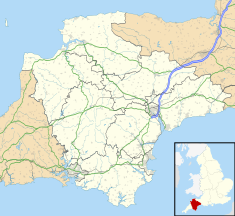
Newton Abbot is a market town and civil parish on the River Teign in the Teignbridge District of Devon, England. Its population was 24,029 in 2011, and was estimated at 26,655 in 2019. It grew rapidly in the Victorian era as the home of the South Devon Railway locomotive works. This later became a major steam engine shed, retained to service British Railways diesel locomotives until 1981. It now houses the Brunel industrial estate. The town has a race course nearby, the most westerly in England, and a country park, Decoy. It is twinned with Besigheim in Germany and Ay in France.

The Palace Theatre & Grand Hall Complex is a multi-purpose entertainment arena complex in Green Street, Kilmarnock, Scotland. The structure, which was originally opened as a corn exchange, is a Category A listed building.
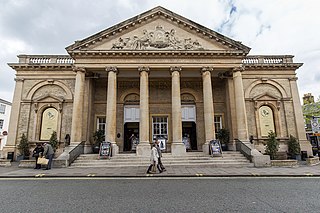
Corn exchanges are distinct buildings which were originally created as a venue for corn merchants to meet and arrange pricing with farmers for the sale of wheat, barley, and other corn crops. The word "corn" in British English denotes all cereal grains, such as wheat and barley. With the repeal of the Corn Laws in 1846, a large number of corn exchanges were built in England, particularly in the corn-growing areas of Eastern England.

Launceston Post Office is a heritage-listed post office at 68-72 Cameron Street, Launceston, Tasmania, Australia. It was designed by William Waters Eldridge, with alterations prior to opening designed by Corrie and North. It opened in 1891, while the clock tower was completed in 1903 and altered in 1910. It was added to the Australian Commonwealth Heritage List on 22 June 2004.

County Hall, formerly known as Dún Laoghaire Town Hall, and before that, Kingstown Town Hall, is a municipal facility in Marine Road, Dún Laoghaire in the county of Dún Laoghaire–Rathdown, Ireland.
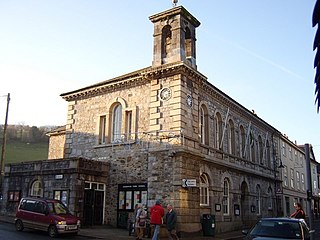
Ashburton Town Hall is a municipal building in the North Street, Ashburton, Devon, England. The town hall, which is the meeting place of Ashburton Town Council, is a Grade II listed building.

Llandovery Town Hall is a municipal building in Market Street, Llandovery in Carmarthenshire, Wales. The structure, which is used as the local public library, is a Grade II listed building.
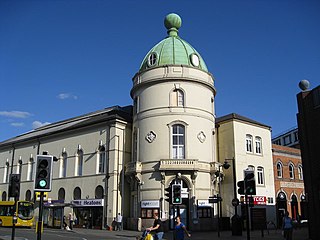
The Corn Exchange is a commercial building in Albert Street in Derby, Derbyshire, England. The structure, which is currently used as an indoor sports venue, is a Grade II listed building.

The Corn Exchange is a former commercial building in Reading, Berkshire, England. The structure, which was commissioned as a corn exchange and the frontage of which is now used as an entrance to a modern shopping complex, is a Grade II listed building.

The Market House, also known as Camborne Town Hall, is a commercial building in Church Street in Camborne, Cornwall, England. The structure, which is currently used as a hotel and public house, is a Grade II listed building.

The Corn Exchange is a commercial building in Queen Street, Market Rasen, Lincolnshire, England. The structure, which is used as the offices of a firm of charted surveyors, is a Grade II listed building.

The Corn Exchange is a commercial building in the Corn Market, Romsey, Hampshire, England. The structure, which has been used extensively as a bank branch, is a Grade II* listed building.

The Corn Exchange is a commercial building in the Market Place, Kettering, Northamptonshire, England. The structure, which was used as a cinema for much of the 20th century, currently accommodates a restaurant.

The Corn Exchange is a commercial building in Broad Street, Stamford, Lincolnshire, England. The structure was refurbished between 2001 and 2008 and is now used as a theatre.

The Corn Exchange is a commercial building in the High Street in Ross-on-Wye, Herefordshire, England. The structure, which is now used as a bookshop and as the offices of Ross-on-Wye Town Council, is a Grade II listed building.

The Corn Exchange is a commercial building in the Market Place, Arbroath, Angus, Scotland. The structure, which is now used as a public house, is a Category B listed building.

Stocksbridge Town Hall is a municipal building in Manchester Road in Stocksbridge, a town in South Yorkshire in England. The town hall, which was previously the offices and meeting place of Stocksbridge Urban District Council, is now the home of Stocksbridge Town Council as well as other community organisations.
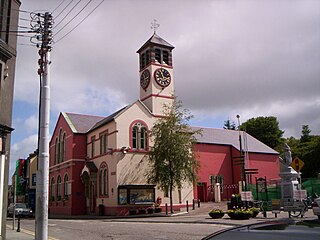
Skibbereen Town Hall is a municipal building in The Square at Skibbereen, County Cork, Ireland. It is currently used as a community events venue, hosting concerts and theatre performances.
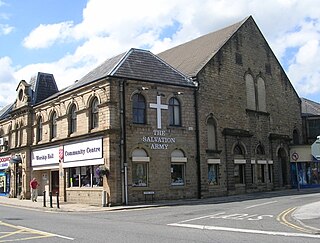
Mirfield Town Hall is a former municipal building in Huddersfield Road in Mirfield, a town in West Yorkshire in England. The building, which was previously the offices and meeting place of the Mirfield Urban District Council, is now used as a worship hall by the Salvation Army.
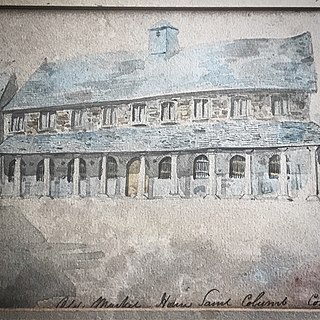
St Columb Major Town Hall is a historic building in the Market Place in St Columb Major, a town in Cornwall, in England. The building, which serves as the offices and meeting place of St Columb Major Town Council as well as a public library, is a Grade II* listed building.

